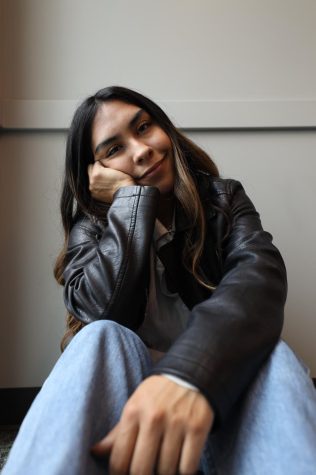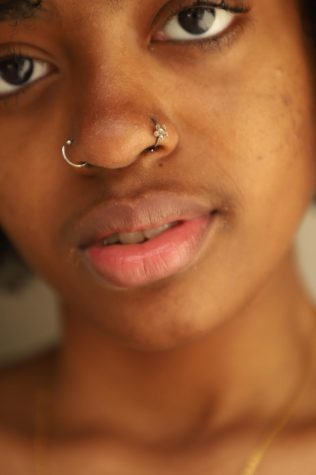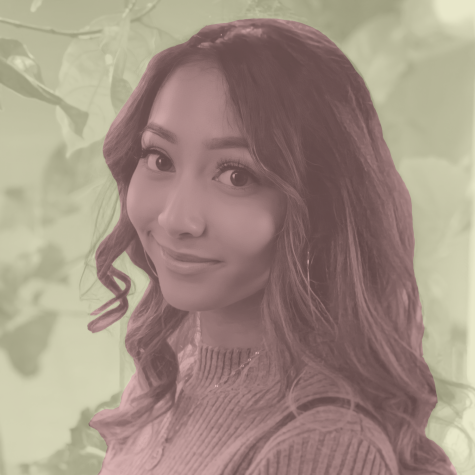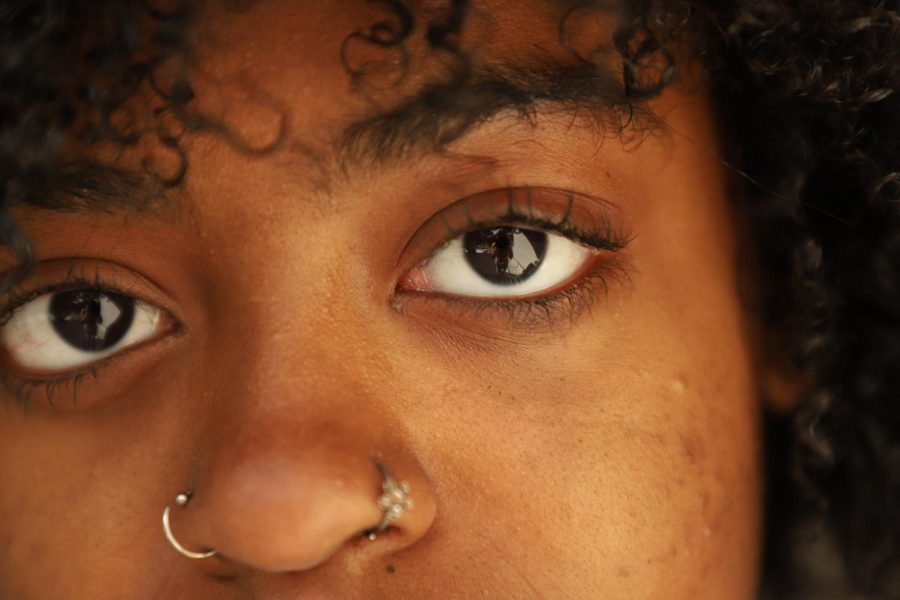Living in a Filtered Reality
Portrait of Jurnee Hernandez on the San Francisco State University campus. (Amaya Edwards / Xpress Magazine)
Plump glossy lips, a perfectly-contoured button nose, defined cheekbones and wrinkle-free skin are features that are easily attainable in just a few swipes thanks to the filters that have made their way to Instagram, Snapchat and other popular social media apps.
Though appearance-altering filters have the possibility to make people “look better” temporarily, they also have the potential to make people feel worse. By altering the way people look through a filter, the issue that appearance-altering filters cause has been coined by experts as “selfie dysmorphia.”
Before social media, constant comparison was derived from seeing retouched models on magazine covers. Now, seeing heavily-edited and filtered Instagram models, as well as the appearance-altering filters we use on our own images, is a newfound source of insecurity.
In a recent survey conducted by Consumer Reports, 59% of Americans find beauty filters “troubling.”
“I’d say that filters aren’t the best for boosting confidence,” explains 22-year-old Gabriella Silva. “Yeah, you look good when you put them on. But as soon as you take it off, you feel a little insecure about the way that you look.”
When filters first rose to popularity, they were known to only change the colors of photos. Instagram’s 2012 look was filled with the signature sepia tone filter for a vintage feel while Snapchat’s “fun” filters changed users’ faces into various types of animals.
Appearance-altering filters first became popular and widely used in 2012 when Silva was in middle school. Not only was she excited for the more playful filters, but she was thrilled to see that some filters added makeup, brighter eyes and long eyelashes.
The more she used these filters, the more Silva realized that she could not hide behind them in real life — there’s a real world outside of filters.
As an Instagram and Snapchat user, Silva feels as if some of the filters on both apps push specific beauty standards.

“I feel like the filters are made so that they specifically make us look the way that society wants us to look in the moment, as far as whatever’s trending or how people are doing their makeup at the time or even nose sizes,” says Silva. “I think that’s why it lowers our confidence when we take them off.”
Kaelen Tabasa, 21, agrees that appearance-altering filters can be harmful if used too much. In connection to Silva’s statement, Tabasa thinks that some of the filters enforce specific appearances as trends.
Recently, the fox-eye makeup trend has made headlines not only for its ever-growing popularity in the social media makeup world, but for its appropriation of Asian features. In order to replicate Asian features, eyeshadow or eyeliner is used to create a sharper and slanted eye versus a wider eye. Certain filters featured on Instagram and Snapchat have been slammed for cultural appropriation, while other filters have the tendency to push Eurocentric beauty standards.
“I think it’s pretty harmful,” Tabasa says. “I feel like it makes different appearances a trend, like with the fox eyes or making your lips bigger. A lot of times it kind of further emphasizes features into ethnic features. I feel like they’re more catered to more Eurocentric people. A lot of people don’t look like that on a normal basis. I just don’t think it’s very good for our self-confidence.”
When appearance-altering filters became popular on Instagram, 18-year-old Jurnee Hernandez realized at first glance that she looked nothing like how filters made her look. Not only did it make her lips appear much bigger than they actually were, but it also made her skin lighter. With the lightening of the skin and changing the color of people’s natural eyes, Hernandez realized some filters were pushing the Eurocentric beauty standard and “trendy” features.

“I just feel like it made me look fake,” Hernandez says. “More like a Barbie doll or something rather than my actual self. The filters alter your whole face and it makes you look extra light. In a way, that’s problematic.”
Hernandez explains that others can be sensitive to the dramatic change that filters do to their outward appearance. She wishes that there were filters that fit everyone’s unique face rather than attempting to convert their face into someone else’s.
Tabasa expresses that depending on filters isn’t the best thing to do. At one point, she claimed that she used filters too much and eventually lost her perception of herself.
“When I look at my Snapchat memories, I don’t know what I really looked like when I was a freshman or sophomore (in high school) because I only used filters,” Tabasa says. “I think that using filters too much made me completely unaware. I just had to get used to myself and really think, ‘Oh, this is how I look.’ And realize that it’s okay. I’m never gonna look like those filters.”
After her realization, Tabasa made a change on her social media accounts and began to use lightly-filtered or barely-edited photos. The only type of filters she uses now are the ones that smooth her skin. In her experience, she’s become more comfortable and confident with herself.
Tabasa believes her confidence level has also helped her younger sisters. As their role model, she wants them to feel comfortable in their own skin, too. Though her younger sisters don’t use Instagram as much as others, they are still enamored by how cool some of the filters are. Tabasa reminds them that filters are not going to make them look better than they already do.
“I think kids right now are influenced even more than we were with social media,” explains Tabasa. “It’s just kind of a slippery slope. If they’re gonna keep thinking, ‘Oh, I only look good with this filter,’ or ‘I only look good with makeup,’ they’re not going to be comfortable with how they really look.”
Unlike most of Gen Z, Hernandez wasn’t exposed to social media at an early age. When she was in elementary school, her mother didn’t allow her to use apps that contain filters in order to protect her confidence levels.
“I’m glad that she did that,” says Hernandez. “I’ve seen what it did to a lot of people around me. I’ve seen people have a lot of self-esteem issues being on social media. When I was finally allowed to have social media, I finally saw what she was trying to shield me from.”
Because Hernandez wasn’t exposed to the constant comparison on social media growing up, she felt that she never struggled with confidence as much as her peers did. She realized that social media is just a filtered lie and it shouldn’t define us.
“They’re called filters for a reason,” says Hernandez. “They’re supposed to change the way you look in a way, but you just have to be confident enough to know that that’s not real life.”
Missouri-based licensed professional counselor and therapist Lindsay Walden describes the detrimental effects appearance-altering filters place on those who use them every day.
“It’s almost like the version of ourselves that lives on social media is not completely grounded in reality,” Walden says. “There’s only so much authenticity that can be on those platforms because you’re showing snapshots of your life. It’s a lot of pressure.”
According to Walden, we are constantly seeing a mirrored reflection of ourselves. When we compare ourselves to that reflection versus what we see in an altered photograph, we’re going to notice a difference. As a result of that difference, we may become unrecognizable to ourselves because what we see in the mirror is not the same as what we see in a photo. Walden explains that the realization of this can be jarring.
“If you’re not okay with who you are from the inside out, you can make whatever cosmetic changes you want to the outside,” Walden says. “But there will always be something that you go to pick out or that you think needs to be different.”
The biggest issue, according to Walden, is when people don’t like how they look without the filter, to the point that they’re constantly comparing themselves to others or want to hide from society.
“Skin is skin,” Walden says. “It has pores, it has blemishes at times and there are wrinkles that naturally appear on our face as we get older. These elements are blurred away or enhanced in some way. Without significant cosmetic procedures, you’re not going to actually look like that. I think filters give a really unattainable sort of image.”

Mariana Garrick (she/her) is a fourth-year journalism major and sociology minor at SF State. She is a former writer and news anchor for On Campus, Insight...


